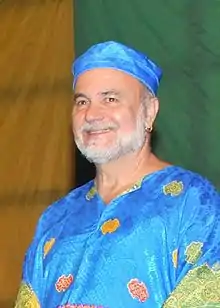Luiz Mott
Luiz Roberto de Barros Mott or Luiz Mott (born 6 May 1946) in São Paulo, is an anthropologist and a gay rights activist in Brazil.

Early life
Luiz Mott graduated in Social Sciences from the University of São Paulo (USP) during the military regime, obtained a masters degree in Ethnography from the Sorbonne and a doctorate in anthropology from the University of Campinas in São Paulo.[1]
Career
Luiz Mott is professor emeritus of the Department of Anthropology of the Federal University of Bahia (UFBA).[2] In his work Mott has traced homosexual desire in a number of indigenous Brazilian tribes such as the Bororo, Guató, Trumai, Tupinambá, Wai Wai and Xavante.[3] He has also explored intimate partner violence between gay, transsexual and transgender people in Salvador, the capital of the Brazilian state of Bahia.[4] In 1995, he declared that national hero Zumbi dos Palmares had been gay.[5]
Alongside his academic work, Mott is also a gay rights activist and founded the Grupo Gay da Bahia in 1980.[6][7] It was the first homosexual support group in Bahia and Mott ensured its survival by pressuring the municipal government to fund it. It published records of homophobic attacks, raised awareness of HIV/AIDS and organised a pride parade, workshops, educational events and protests.[4] He also created Centro Baiano Anti-AIDS.[2]
In 1995, he was awarded the Felipa de Souza Award by the International Gay and Lesbian Human Rights Commission (now OutRight Action International).[7] Mott commented to the Los Angeles Times in 2015: "Brazil is an extremely contradictory country. On the one hand, we are a pink country, celebrating sexual diversity [..] then, there is another color, the red blood of victims."[6]
References
- "Luiz Roberto de Barros Mott". Ciência e Cultura (in Portuguese). Retrieved 11 July 2020.
- Haggerty, George (2013). Encyclopedia of Gay Histories and Cultures (eBook). Routledge. ISBN 978-1-135-58513-6. Retrieved 11 July 2020.
- Conner, Randy P.; Sparks, David Hatfield (2004). Queering creole spiritual traditions: lesbian, gay, bisexual, and transgender participation in African-inspired traditions in the Americas. Psychology Press. p. 47. ISBN 978-1-56023-351-0.
- Allen, Andrea Stevenson (2016). Violence and Desire in Brazilian Lesbian Relationships. Springer. p. 12. ISBN 978-1-137-48984-5. Retrieved 11 July 2020.
- Voss, Barbara L.; Casella, Eleanor Conlin (2011). The Archaeology of Colonialism: Intimate Encounters and Sexual Effects. Cambridge University Press. p. 259. ISBN 978-1-139-50313-6. Retrieved 11 July 2020.
- Bevins, Vincent (22 March 2015). "Homophobic attacks increase in seemingly gay-friendly Brazil". Los Angeles Times. Retrieved 11 July 2020.
- "A Celebration of Courage: Felipa Awardees 1994-1999". OutRight Action International. 1 May 1999. Retrieved 11 July 2020.
External links
- Grupo Gay da Bahia. (Intro page in English/Website is mostly in Portuguese).
- Revolução homossexual: O poder de um mito (In Portuguese).